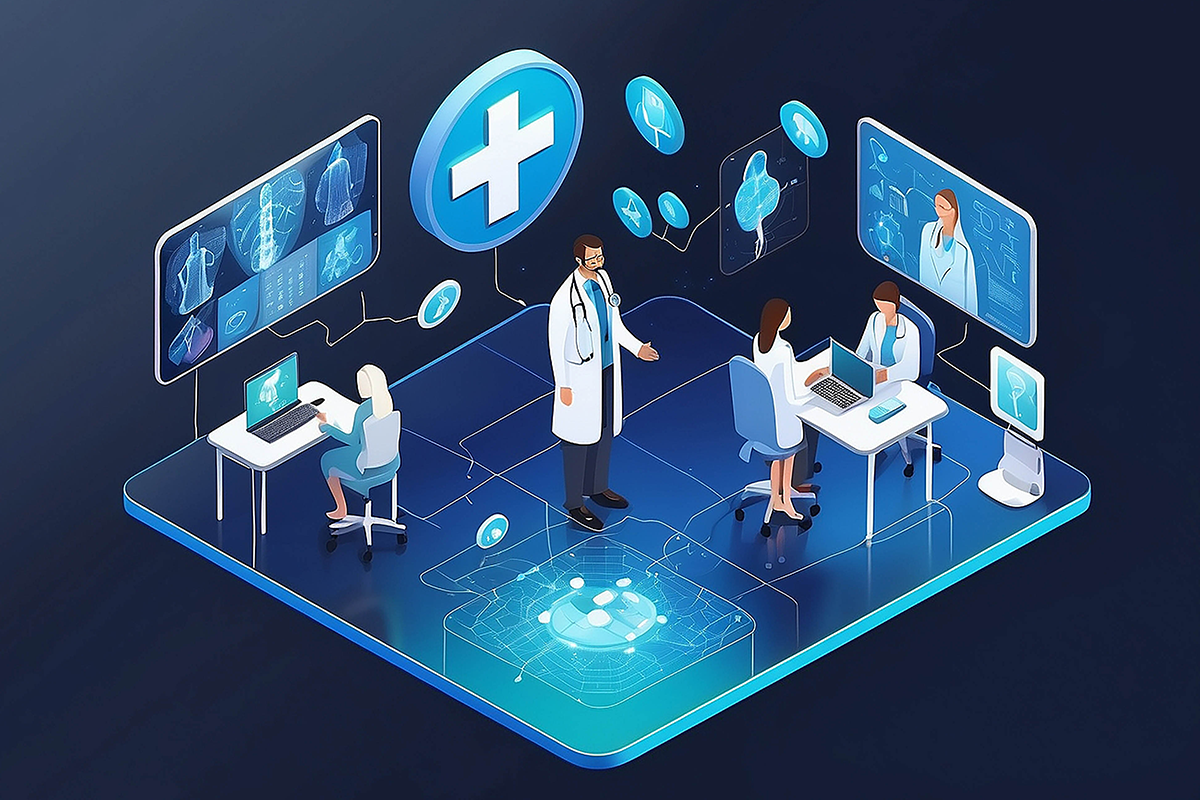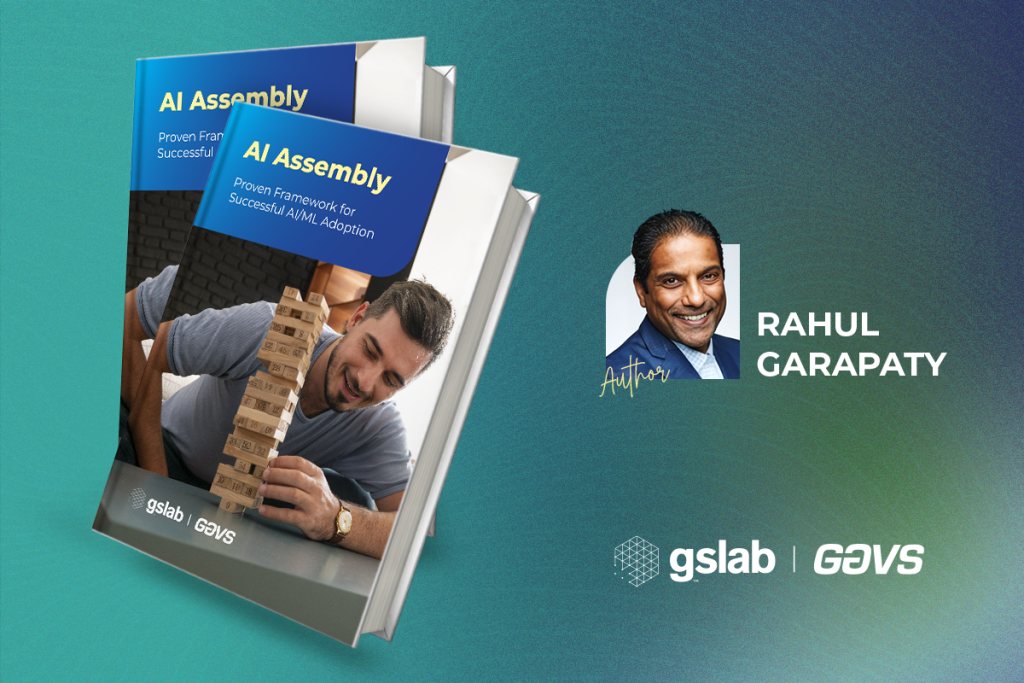The adoption of AI in healthcare has improved quality, access, individualization, and patient experience. In the healthcare contact center realm, AI has evolved from basic automation to intelligent automation, where chatbots and virtual assistants exhibit increased capability, including brand awareness and empathy. The next frontier is proactive, insightful AI that can surpass our expectations, though it must navigate challenges and constraints, especially in healthcare, where accuracy is paramount.
GS Lab | GAVS conducted a webinar on Harnessing the Power of AI in Healthcare Contact Centers. Ms. Julia Zhou, CIO – Cinqcare and Dr. Venkatesh Krishnaswamy, Founder and CEO – Koopid Inc. were the panelists. Mr. Richard Alan Courshon, Associate VP – Healthcare at GS Lab | GAVS moderated the session.
Role of AI in Healthcare Contact Centers
AI presents significant opportunities to streamline automation and enhance business processes for healthcare organizations, benefiting both payers and providers. One key aspect is accessibility, recognizing that not everyone can access advanced technology. Contact centers can play a pivotal role in bridging this gap, assisting individuals who may struggle with digital tools. From basic needs like pharmacy renewals and lab result inquiries to more personalized attention from doctors or nurse practitioners, contact centers can handle various tasks, tailoring interactions to meet each patient’s unique needs.
Furthermore, AI-powered chatbots and tailored dialogue options within contact centers can enhance user experiences by providing efficient, convenient, personalized assistance. For instance, sending proactive notifications about bills or appointments via text or email can improve communication and facilitate easier patient payment processes. There is huge potential for AI to enhance patient experiences by offering convenient and proactive solutions. Healthcare organizations can create a win-win situation by leveraging AI to ensure patients enjoy a smoother, more informative, personalized experience.
AI in Revenue Cycle Management
AI in revenue cycle management offers several opportunities to enhance productivity, streamline processes, and improve patient outcomes. Several mature technologies like conversational virtual agents, agent assist tools, and triage systems are ready for adoption in healthcare contact centers. These technologies offer immediate benefits and have been proven effective in improving service delivery and efficiency.
By automating scheduling, resource management, and claim processing tasks, AI can free up time for healthcare professionals to focus on patient care. Additionally, AI can proactively monitor patient progress and intervene as necessary, reducing inefficiencies and improving the overall quality of care. Overall, AI has the potential to revolutionize revenue cycle management, making healthcare organizations more efficient and effective in delivering high-quality care to patients.
Importance of Cybersecurity in Healthcare
While AI brings immense potential for automation and efficiency, it’s crucial to remember that it’s not infallible. Human intervention is essential to ensure accuracy, quality, and patient safety. It’s about striking the right balance between leveraging technology to enhance patient experiences while still upholding the standards of care through a collaborative effort involving people, processes, and technology.
Ensuring cybersecurity is paramount in healthcare, especially as we strive to provide the best care while safeguarding patient information. It involves designing, configuring, and protecting systems and establishing policies and procedures for data access. Authentication measures are crucial to verify the identity of users accessing sensitive information. As technology advances, so do the tactics of malicious actors, necessitating ongoing vigilance and adaptation to maintain data security.
Things to Consider While Adopting AI
Adopting AI in healthcare organizations requires a thoughtful and strategic approach. Assessing the organization’s readiness for AI implementation is essential, ensuring a clear understanding of the problem to be solved and the expected outcomes.
- Organizations should also evaluate whether they have the necessary data quality, infrastructure, and cultural readiness to support AI initiatives effectively.
- Considering both specific use cases and broader enterprise-level approaches can help organizations maximize the benefits of AI technology.
- Maintaining a focus on the ultimate goal of improving patient outcomes is paramount throughout the adoption process.
Future of AI in Healthcare
In the future of healthcare, AI is poised to play a significant role in improving health literacy and equity. There’s a growing trend towards AI-driven conversations that assist patients in understanding diagnoses, prescriptions, discharge instructions, and more. This conversational AI can be a virtual assistant, guiding patients through Q&A sessions tailored to their needs. Whether pre-qualification for surgery, post-surgery follow-up, mental health support, or wellness advice, AI-powered interactions are becoming increasingly conversational and accessible, potentially even through voice assistants for those without access to screens.
The rapid growth and investment in AI, exemplified by companies like Nvidia, indicate the profound impact it will have on various industries. However, there are also concerns about the implications of these advancements, highlighting the importance of implementing human safeguards and controls to ensure that AI is utilized responsibly and ethically. It’s essential to let business needs drive technology adoption in healthcare. Educating business partners about the possibilities of technology can facilitate collaboration and innovation. While there’s immense potential in AI and other disruptive technologies, it’s crucial to approach adoption thoughtfully, considering factors like data security and integration.
While this blog offers only a high-level gist of the webinar, you can watch the entire webinar here. For more such videos, you can visit https://www.gslab.com/webinars/ and https://www.gavstech.com/videos/.
GS Lab | GAVS believes in harvesting the power of AI for smart healthcare operations. GS Lab | GAVS’ Artificial Intelligence as a Service (AIaaS) is focused on leveraging AI to improve holistic health of patients and drive better health outcomes through preemptive care, while keeping healthcare costs low. Our AI/ML services are available for providers and payers. Please visit https://gavstech.com/brochures/aritificial-intelligence-as-a-service-aiaas-for-healthcare/ to learn more.




